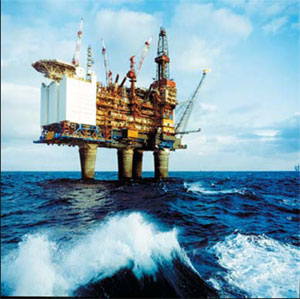StatoilHydro forges bonds with China
Established on October 1, 2007 with the merger of Norway's national oil company Statoil and the oil and gas operations of Hydro, StatoilHydro (SH) is now a giant enterprise with ambitions for global growth. Ole Johan Lydersen, president of StatoilHydro China, talked with China Daily about his expectations for growth through powerful partnerships.
Merger frees capacity
|
StatoilHydro is the world's largest operator in deepwater fields. |
"We merged the Statoil and the Hydro oil and gas operations and the results are already competitive and show a fully functioning organization," Lydersen said.
SH's market capitalization is approximately $100 billion following the merger, ranking it among the world's 50-largest listed companies. It is traded on the Oslo and New York stock exchanges.
"The merger has freed important capacity and we have been adding acreage and resources after the merger," Lydersen said. "This has been accomplished by successful exploration, business development and technology implementation."
With its entitlement production averaging approximately 1.9 million barrels of oil equivalent a day and with proven reserves of more than 6 billion barrels, SH is now the biggest seller of oil products in Scandinavia, the world's third-largest net seller of crude oil and a major supplier of gas to the European market.
The company is the world's largest operator of deepwater fields and is also a world-leader in the use of deepwater technology and carbon capture and storage.
It now has 31,000 employees in the 40 countries where it has operations. While retaining its strong position on the Norwegian continental shelf, the enterprise is now accelerating its international growth.
Commitment and ambition
SH's relations with China go back more than 30 years when its first Beijing office opened in 1982. In the early years the enterprise "assisted authorities and oil companies on technology transfer, oil regulations and legislation issues", Lydersen said.
Coincidentally, Lydersen started working at Statoil the same year it opened its first Beijing office. He was appointed president of StatoilHydro China when the new merged company was created.
|
Carbon capture and storage technology by the State-owned oil company |
Lydersen said decades of pioneering operations in challenging environments have taught SH how to meet new industry's challenges, such as increasing energy gap and environmental challenges, which are also huge for China.
"All this, along with being a listed, partly privatized national oil company with a deep and longstanding relationship with the Chinese national oil companies, form the foundation for our ambitions to become a major player in China's gas and oil developments through strong partnerships with China's national oil companies," he noted.
The president added that China's national oil companies enjoy a reputation as steadfast, harmonious and open to change. SH's corporate culture and history as a national oil company provide an "exciting and different basis for developing close and powerful partnerships" with Chinese national oil giants, he said.
"We believe that successful partnerships are founded on trust, openness, cooperative culture and good personal relations."
"A good example on this, I believe, is the strategic cooperation that is under development between China National Petroleum Corp (CNPC) and StatoilHydro," he said.
SH signed an agreement with CNPC for strategic cooperation in four areas, including domestic and international exploration and production, liquefied natural gas and research and development.

"Another good example is our work together with China National Offshore Oil Corp (CNOOC) on the Lufeng field," Lydersen said. Owned by SH together with CNOOC, the Lufeng 22/1 field in the South China Sea has been in production since 1997.
Even though challenges remain, the president said SH will continue to enhance cooperation and develop powerful partnerships with its Chinese counterparts in the coming years.
"StatoilHydro represent a strong platform for value capture and growth. With our experience in a number of deliveries in harsh environment applying world leading technologies, we will intensify our efforts to contribute to China's energy development in a sustainable and environment friendly way." Lydersen said.
(China Daily 05/16/2008 page19)
















